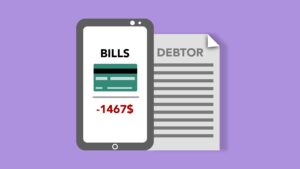Stop Creditor Harassment with Chapter 7 Bankruptcy
Creditor harassment can be a stressful and overwhelming experience for anyone who is struggling with debt. Fortunately, there is a legal solution that can provide relief: Chapter 7 bankruptcy. In this post, we’ll focus on how to stop creditor harassment with a Chapter 7 bankruptcy.
First, it’s important to understand what Chapter 7 bankruptcy is and how it works. Chapter 7 is a form of bankruptcy that allows you to discharge most of your unsecured debts, such as credit card debt, medical bills, and personal loans. This means that you will no longer be responsible for paying these debts after the bankruptcy is complete.
To file for Chapter 7 bankruptcy, you must meet certain eligibility requirements. These requirements include passing a means test, which is used to determine whether your income is low enough to qualify for Chapter 7. If you do qualify, you will need to complete a bankruptcy petition and provide detailed information about your income, expenses, assets, and debts.
Once you file for Chapter 7 bankruptcy, an automatic stay goes into effect. This means that creditors are prohibited from taking any collection actions against you, including phone calls, letters, and lawsuits. The automatic stay can provide immediate relief from creditor harassment and give you the breathing room you need to focus on your bankruptcy case.
In addition to the automatic stay, Chapter 7 bankruptcy can provide long-term relief from creditor harassment by discharging your debts. When your debts are discharged, creditors are legally prohibited from attempting to collect on them in the future. This means that you can enjoy a fresh start, free from the burden of overwhelming debt and constant creditor harassment.
It’s important to note that Chapter 7 bankruptcy does not discharge all types of debt. Certain debts, such as tax debts, student loans, and child support payments, are not dischargeable in bankruptcy. However, even if you have non-dischargeable debts, filing for Chapter 7 can still provide relief from creditor harassment by stopping collection actions related to those debts.
If you’re experiencing creditor harassment and considering filing for Chapter 7 bankruptcy, it’s important to work with a qualified bankruptcy attorney. An attorney can help you understand your options and guide you through the bankruptcy process, from filing your petition to attending your 341 meeting of creditors.
If you’re struggling with debt and facing creditor harassment, Chapter 7 bankruptcy can provide relief. By discharging most of your unsecured debts and implementing an automatic stay, Chapter 7 can stop creditor harassment in its tracks and provide you with the fresh start you need to get back on your feet. If you’re considering bankruptcy, it’s important to consult with a qualified attorney who can help you navigate the process and ensure that your rights are protected.
Chapter 7 bankruptcy allows you to discharge most unsecured debts, it can provide you with a clean slate and a fresh start. You can begin rebuilding your credit immediately after your debts are discharged, and with responsible financial behavior, you can rebuild your credit score.
Dealing with Creditor Harassment and Violations of the Fair Debt Collection Practices Act (FDCPA)
One of the most significant benefits of filing for Chapter 7 bankruptcy is that it can put an end to creditor harassment and violations of the Fair Debt Collection Practices Act (FDCPA). The FDCPA prohibits debt collectors from engaging in abusive or deceptive practices, such as calling you at work or threatening legal action if you do not pay your debts.
If you are being harassed by creditors or believe that your rights under the FDCPA have been violated, it is important to speak with an experienced bankruptcy attorney who can help you take legal action against the offending parties.


